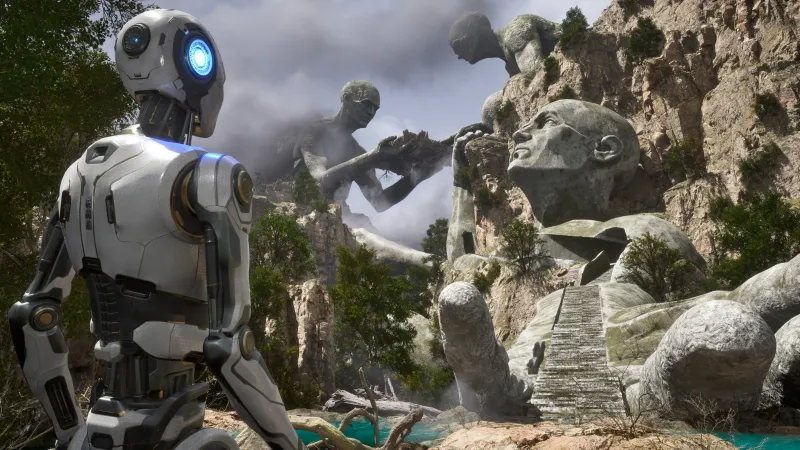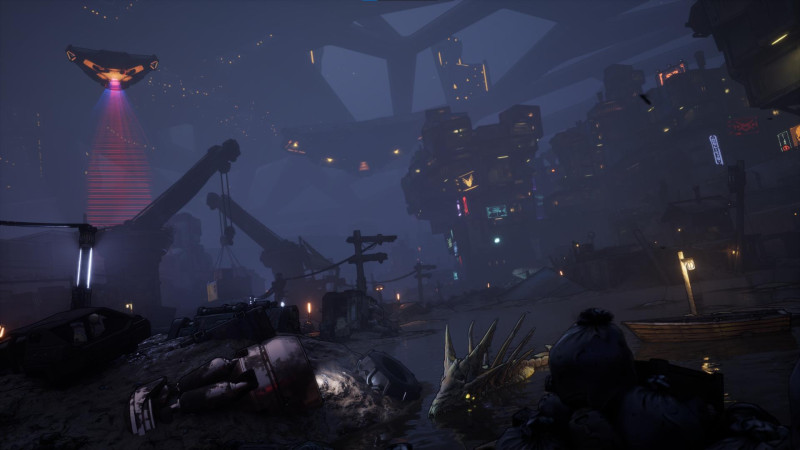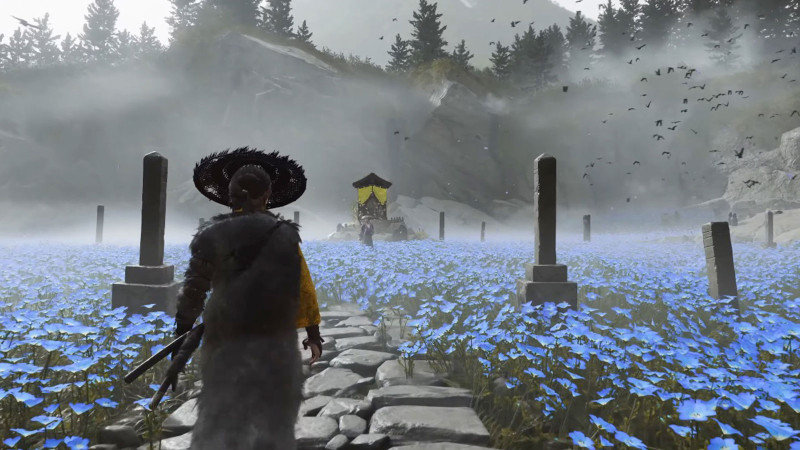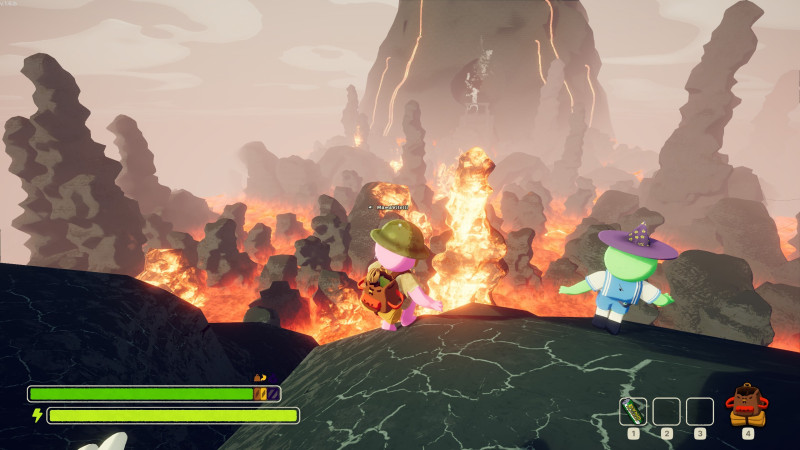The Talos Principle II often left me staring at my screen in awe. Sometimes, from sheer intimidation in the face of a seemingly formidable puzzle. Other times, from my incredulous pride after unraveling said problem. But most of all, the experience regularly gave me pause as I pondered a philosophical idea or argument that challenged my viewpoints on the nature of existence and humanity’s place in the cosmos. These moments spurred me to solve the game’s 100+ puzzles in search of answers, and I’m largely satisfied with what I discovered.
Set hundreds of years after its 2014 predecessor, The Talos Principle, you awaken in a utopian civilization as its 1000th – and final – sentient robot resident. Following mankind’s extinction due to a global virus centuries prior, intelligent machines designed by a brilliant scientist have inherited the Earth. As the sum of all human knowledge, these machines have resigned themselves to living within a single, modest city with strict population, exploration, and consumption limits to avoid repeating humanity’s mistakes. However, these beliefs are flipped on their heads when a mysterious entity taking the form of the Greek titan Prometheus beckons the machines towards a mysterious island with a pyramid-like megastructure, towers, and, of course, puzzles. You join a small expedition to discover the island’s origin and purpose.
Despite the puzzles being the stars, I enjoyed The Talos Principle II’s focus on storytelling and character development, highlighted by choice-driven conversations that do a great job of emphasizing the machines’ inherited sense of humanity. I became invested in getting to know my crew, such as two close friends with opposing yet valid viewpoints on how society should advance or having more lighthearted chats with a resident unsure of whether or not to keep its surfer-style speech pattern. Decisions influence the city’s direction and your standing in ways you won’t see for hours, and while I found the outcomes to be adequately satisfying, some optional threads, such as choosing whether or not to join an Illuminati-style secret group, don’t always lead to an impactful payoff.
Regardless, The Talos Principle II presents many angles on important topics and leaves it up to its cast and players to decide what they believe. Fascinating philosophical concepts on the morality and responsibility of being an intelligent entity in a chaotic universe, numerous lore notes and audio logs, and even the city’s social media feed had me reconsidering my biases and beliefs in enriching and enlightening ways, even if I didn’t always agree. I’m still mulling over a log’s musings over humanity’s puzzling attitudes on natural extinction versus human-made extinction.
I like that the game doesn’t prop any viewpoint as the “correct” one, and it doesn’t need to; the point is that you should ask such questions to see things from as many angles as possible, and players will draw their own conclusions to determine one of the story’s several endings. A plethora of dialogue choices does an admirable job of letting players express several potential perspectives, while the plot is an engaging and insightful mystery boasting neat twists and heavy revelations.
Like the first game, placing crystal refractors to direct light beams around obstacles to the correct lock(s) to open the exit is the core puzzle-solving experience. New mechanics add exciting and creative layers while eliminating the annoying death-dealing hazards, such as bombs and turrets, from the last game. New tools include a device that creates portals on certain surfaces, an anti-gravity machine that lets players (and objects) stand on walls and ceilings, and a refractor that inverts light colors, among others. Each tool is a treat to work with alone, but the game soars highest when challenging you to use several in concert.
Puzzle-solving is still a tricky exercise of placing, moving, and/or stacking objects in the correct spots or sequence, a process thankfully expedited by speedy player movement. Still, lengthier puzzles require a lot of running around to rearrange things, which sometimes wore on me. The final puzzle is the worst offender, as it requires a tedious amount of back-and-forth trekking to execute such a precise order of operations that slipping up often meant restarting the whole thing from scratch. Despite these headaches, I was consistently impressed with how developer Croteam managed to concoct so many well-thought-out puzzle rooms, and solving them never stopped feeling like a well-earned achievement.
Unlike the last game, there’s no hint system, but you can skip puzzles entirely by spending a collectible resource. The catch is that finding these helpful tokens is a task in itself, as they’re hidden throughout the open areas. I don’t mind this as someone too stubborn to skip unless a puzzle is truly mind-boggling, and it gave me another excuse to explore, but it does create more work for those eager to move on and see the rest of the narrative.
The biodiverse island is broken up into four cardinal regions composed of three smaller open hubs, each sporting eight primary puzzles plus optional riddles and collectibles. I enjoyed roaming these expansive regions between puzzles in search of smaller rewards such as lore notes, ancient human tech, or secret laboratories containing tantalizing secrets. The worlds also look quite nice despite frequent geometry pop-in. Though an overhead compass provides some guidance on how to find points of interest, the lack of a proper map made revisiting some destinations more of a chore than I would have liked. Environmental puzzles, such as rerouting an island-wide light beam or chasing hidden particle clouds to statues, offer neat side diversions and welcomed breaks from the critical path. The other major recurring puzzle comes in the form of assembling bridges by correctly rotating and connecting giant Tetrinomo pieces, though this exercise lost its luster after a few hours.
The Talos Principle II is a long game, perhaps to a fault. I clocked in around 34 hours, and despite my generally consistent enthusiasm, I was ready to see the end before it hit me with another round of puzzles or a story-focused exploration segment. It’s an ambitious and ultimately well-made package with many social, artistic, and scientific ideas that I’ll be thinking about for the foreseeable future, long after the solution to its final riddle has faded from memory. That enlightenment makes The Talos Principle II’s challenges worth the effort.









